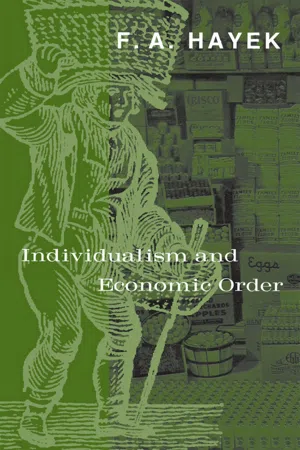![]()
Notes
I. Individualism: True and False
It is significant that the physiocrats already were led from the rationalistic individualism from which they started, not only close to socialism (fully developed in their contemporary Morelly’s Le Code de la nature [1755], but to advocate the worst depotism. “L’État fait des hommes tout ce qu’il veut,” wrote Bodeau.
It may be of interest to compare these passages with the similar statements in which Ferguson’s contemporaries expressed the same basic idea of the eighteenth-century British economists:
Josiah Tucker, Elements of Commerce (1756), reprinted in Josiah Tucker: A Selection from His Economic and Political Writings, ed. R. L. Schuyler (New York, 1931), pp. 31 and 92: “The main point is neither to extinguish nor to enfeeble self-love, but to give it such a direction that it may promote the public interest by promoting its own. . . . The proper design of this chapter is to show that the universal mover in human nature, self-love, may receive such a direction in this case (as in all others) as to promote the public interest by those efforts it shall make towards pursuing its own.”
Adam Smith, Wealth of Nations (1776), ed. Cannan, I, 421: “By directing that industry in such a manner as its produce may be of the greatest value, he intends only his own gain, and he is in this, as in many other cases, led by an invisible hand to promote an end which was no part of his intention. Nor is it always the worse for the society that it was no part of it. By pursuing his own interest he frequently promotes that of the society more effectually than when he really intends to promote it.” Cf. also The Theory of Moral Sentiments (1759), Part IV (9th ed., 1801), chap. i, p. 386.
Edmund Burke, Thoughts and Details on Scarcity (1795), in Works (World’s Classics ed.), VI, 9: “The benign and wise disposer of all things, who obliges men, whether they will or not, in pursuing their own selfish interests, to connect the general good with their own individual success.”
After these statements have been held up for scorn and ridicule by the majority of writers for the last hundred years (C. E. Raven not long ago called the last-quoted statement by Burke a “sinister sentence”—see his Christian Socialism [1920], p. 34), it is interesting now to find one of the leading theorists of modern socialism adopting Adam Smith’s conclusions. According to A. P. Lerner (The Economics of Control [New York, 1944], p. 67), the essential social utility of the price mechanism is that “if it is appropriately used it induces each member of society, while seeking his own benefit, to do that which is in the general social interest. Fundamentally this is the great discovery of Adam Smith and the Physiocrats.”
It has become usual to describe Giambattista Vico and his (usually wrongly quoted) formula, homo non intelligendo fit omnia (Opere, ed. G. Ferrari [2d ed.; Milan, 1854], V, 183), as the beginning of the antirationalistic theory of social phenomena, but it would appear that he has been both preceded and surpassed by Mandeville.,
Perhaps it also deserves mention that not only Mandeville but also Adam Smith occupy honorable places in the development of the theory of language which in so many ways raises problems of a nature kindred to those of the other social sciences.
